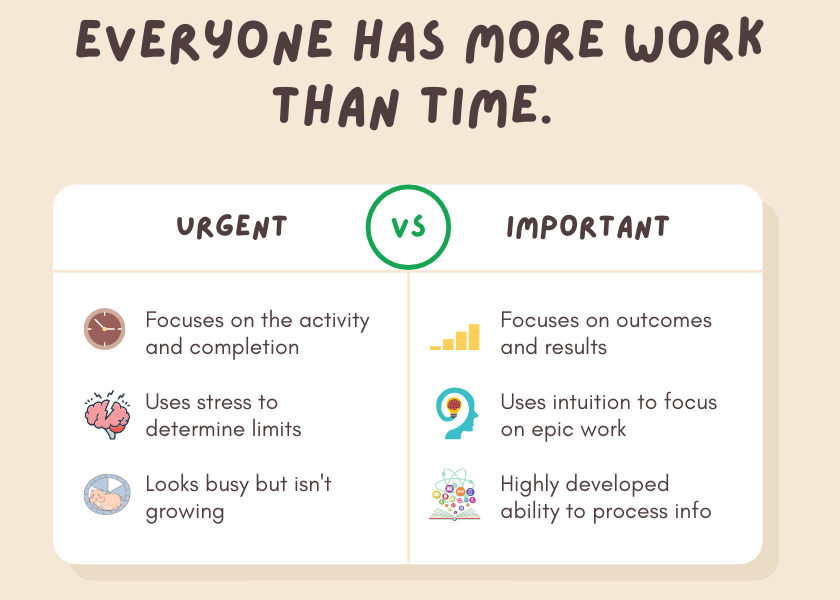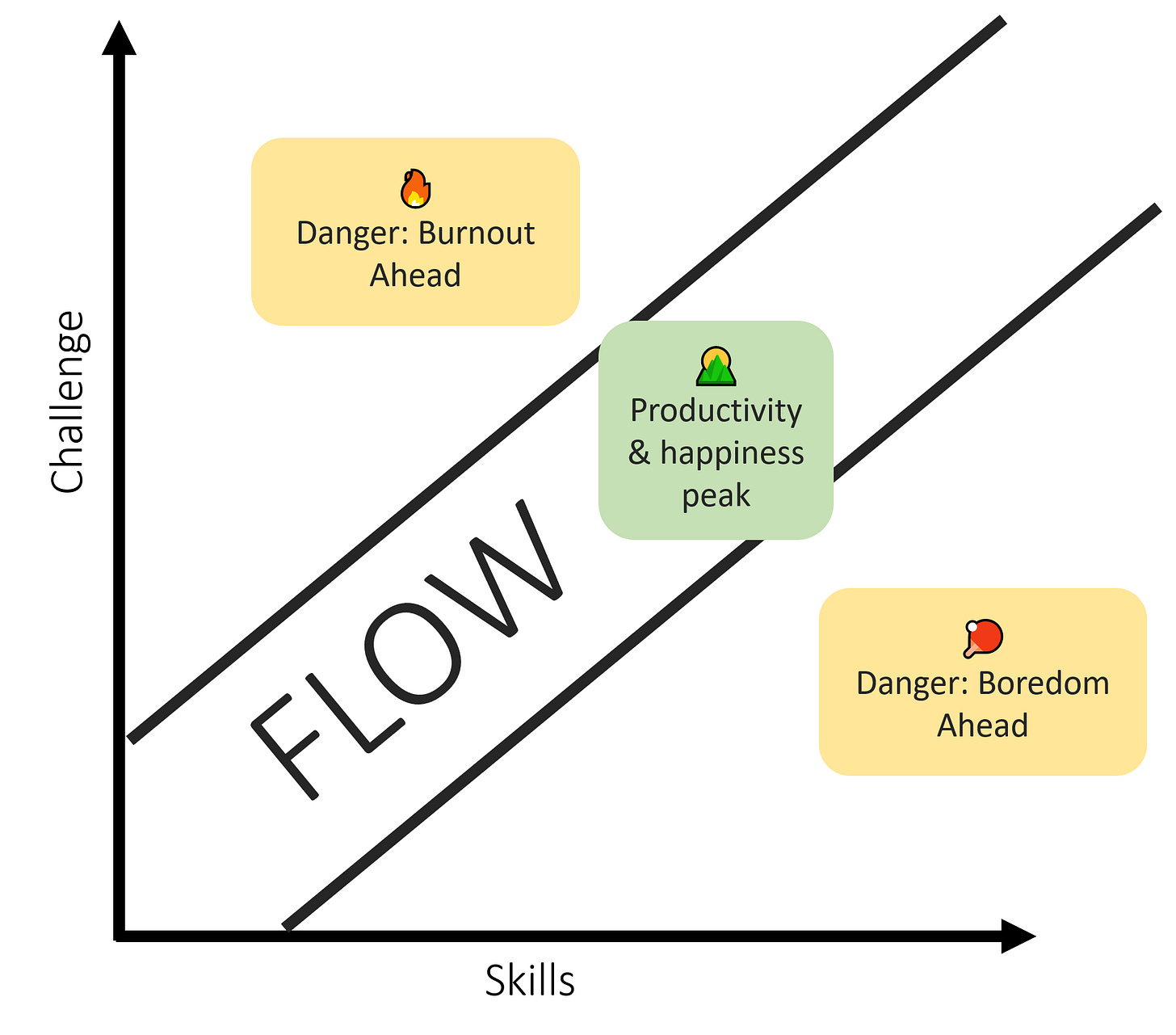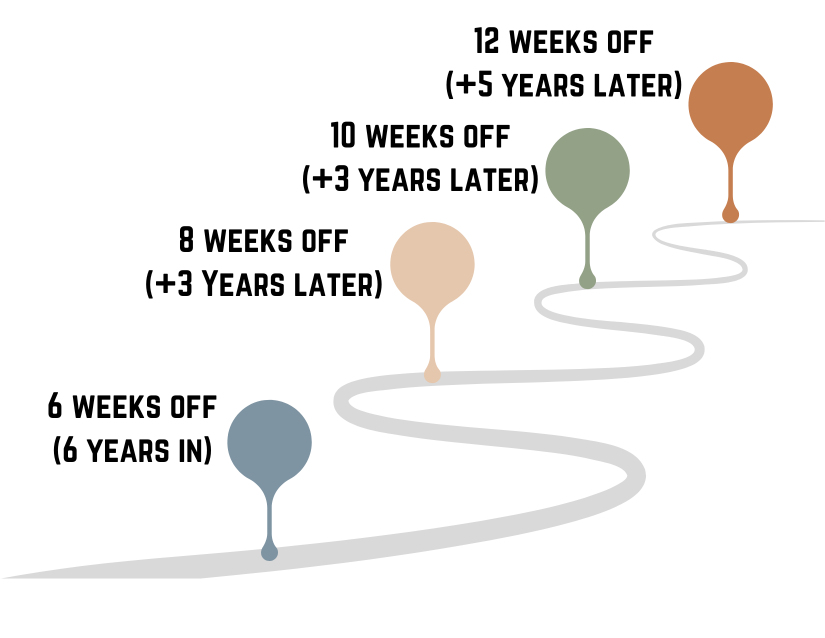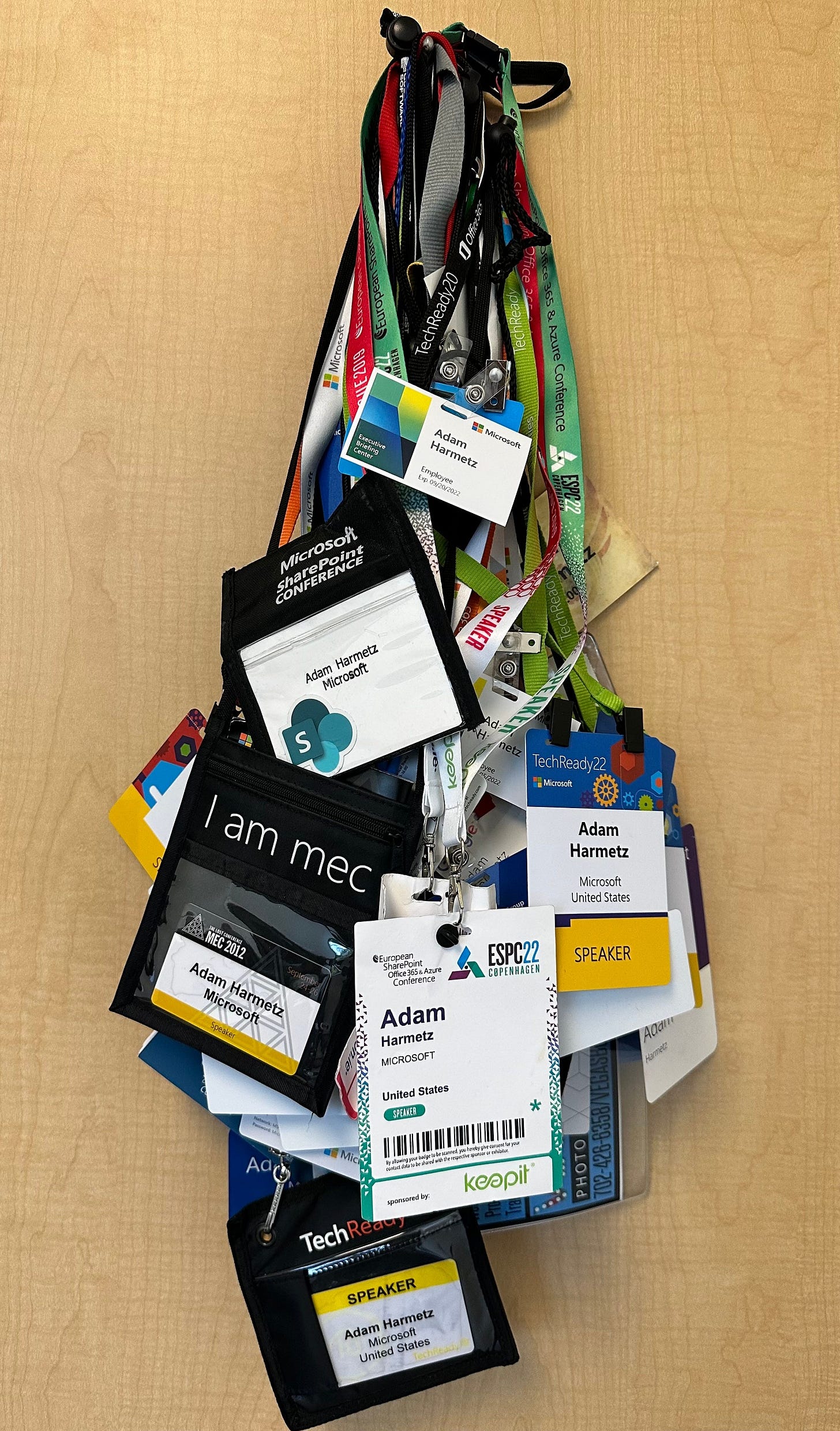Well, my career at Microsoft is officially a legal adult. It’s not long now until the intern class will have been born the year I started at the company. 👀
As is tradition on my work anniversary, here is a note to my 2005-era self, just starting a career in tech. It’s the fifth version of this note; I add one more thing every year and refine the rest to reflect the biggest concepts on Mind The Beet.
It’s hard to capture the awesome privilege, luck, and support network that I’ve had in my time here that were major determinants of my success, and I’ll ask for grace as I do my best to synthesize my own lived experiences with these eighteen biggest lessons.
Dear fresh-out-of-college Adam from 2005:
Congrats on your job with Microsoft! What an interesting time to start in tech - you just signed up for Facebook during your last week of final exams at UCLA, Google IPO'd one year ago, and the iPhone will launch in 2 years. You will see cloud & mobile go from niche to indispensable worldwide utility and the AI era is just beginning as I write this.
Your career will span the Golden Age of tech, with all the dividends that provides as well as all the unsolved risks that powering the world economy brings - security, privacy, AI ethics to name a few.
In your own corner of the industry, you will live through a generational shift in computing from on-premises to the cloud. A paradigm shift will be fascinating to experience as you’ll try to stay customer focused under a cycle of unbundling and re-bundling. You’ll read about DEC and IBM and Intel and be shocked at the historical similarities. This will also teach you that large organizations are not as set in stone as intuition implies. Satya’s leadership as CEO will allow you to experience a transformation when culture, business model, and strategy align to the right market conditions.
The most controversial part of your career is that you stayed with the same company for 18 years, reinventing yourself as the company grew, extended, and transformed. This was not the plan and leaves you reflective on how to avoid states like good enough and comfortable. If “the unexamined life is not worth living,” how can one do enough self-examination without seeing what’s out there? Your own lived experience these past 18 years proves that one can thrive by staking out a product and team as a home for a while.
Here are eighteen things you’ll learn in eighteen years.
Starting Your Career
Let’s start with a few lessons on how to start and evolve your career.
1. 👕 Early on: Prioritize fit over growth.
For the first 5 years out of college, you’ll ask yourself more what you love to do rather than how to have a great career. You will treat this just like a product backlog and ensure you have a flow of good options to sort your current job against. You’ll have a fellowship that gives you an option to go back for a PhD in 2 years. You’ll consider switching to being a dev. You’ll sit in on MBA classes. All of these will rank poorly against the notion of going deep on product at a large company, but you’ll gain confidence about the Tech-x-Business career path by asking yourself the questions. Doors will indeed start to shut 5 years into the career, where the consequences of a non-linear career shift increase, but the unhappiest folks you work with are those who never pressure tested their role or job. They optimized for growth over fit.
2. 🧼 Establish great fundamentals: Time, tasks, info diet.
We live in a time when the information in the world is doubling every 5-8 months now – you’ll need to invest time to ensure your ability to consume information, tasks, and communication keep growing just as fast. Early in career, you’ll focus on the basics of being a curious, informed, and hungry member of the knowledge economy. Smartly managing your time, your tasks, and your information diet has a way bigger impact on getting you to leadership roles than anything else. You’ll learn the difference between urgent and important.
3.🪴Evolve your job until you get paid to learn.
You are the son of a teacher; the love of learning was instilled in you at an early age. This will be your best secret weapon. It will help to remind you of the power of curiosity as a cure for burnout. Being around those who love to learn new things will help you anticipate contemporary trends and paradigm shifts. You’ll have a mantra for when you are at your best: You should spend 80% of your time on the job learning. That’s not a typo - it forces you to incorporate learning into what you do instead of just relegating learning to a couple of classes a few times a year.
4. 🏄️ Think about your career as finding, catching, and riding the right waves.
When you start your career, you’ll be told it’s the start of a long upward journey that must build on itself. This “career ladder” metaphor does more harm than good. No, better to think about your future as catching some waves. This will get you thinking about repetition and cycles, project selection, riding something with more momentum than you have yourself, and knowing when you are in the whitewash and need a change.
5. ✌ Find the epic difference makers in your work.
“No matter how good you are, you're going to lose one-third of your games. No matter how bad you are you're going to win one-third of your games. It's the other third that makes the difference.” - Tommy Lasorda
This quote speaks to how you think about the quality bar for your work. There is only a part of your work that will be a difference maker - and puzzling out where to stretch yourself every season will be the key to remarkable results. You’ll gravitate to the word “epic” to represent this. Epic means finding the problems where extreme pride in the quality of the work will make a difference. This will sometimes be high visibility projects but sometimes it’s the unsung efforts that are just as epic. You'll remember vividly that one of your first projects at the company was to write fifty error strings for various problem conditions. You will take the time to understand each condition, establish a consistent error taxonomy, and just in general write the best damn error strings on the planet. It's not that it was hard; it was just that no one else had time to go deep like that. For you, that season as a junior employee focused on high craft, stellar error strings will be the highest impact way to be epic.
Sustaining Your Career
It’s not really about “work/life balance” - it’s about managing your energy and exploring how what drives you will change over time.
6. 🏓 Define the boredom & burnout boundaries.
If you are going to stay on the same team, you need to watch your own boredom. But what is boredom anyway? Frameworks help. You’ve seen many over the years and two stick out to you: Daniel Pink's Autonomy, Mastery, and Purpose is the best quick framing of what goes into staying motivated. And Mihaly Csikszentmihalyi’s Flow Diagram is a high bandwidth way of ensuring you think about peak performance.
7. ☕ Over time, it becomes less about mastery (“How?”) and more about purpose (“Why?”).
You will wish someone had told you that finding your purpose happens over time and the desire for deeper meaning crescendos mid-career. It’s common to focus on mastery in the first part of your career - society wants you to just get good at something in your 20s and early 30s. It’s much less clear on what to do with your now finely-honed skills in your late 30s and 40s. It’s amazingly universal that people stumble into a mid-career crisis trying to figure out how their work has meaning - and the solution is just to talk about it with colleagues and explore what drives you over time. “What’s your purpose?” will be a source of deep and meaningful connection with other leaders as you age.
8. 🏖️ Take your retirement along the way.
Careers need to be like the old magnetic hard drives - they need serious pauses in them for maintenance defrags. Every few years, you’ll find a way to take an extended time away from work - more than just your typical 4-5 weeks of scattered paid time off every year: at least six contiguous weeks, one time up to 12 weeks. The reasons vary - honeymoon, paternity leaves, sabbatical. You will intersperse your retirement time into your career while you are young enough to enjoy it. You'll be fortunate to have a work culture that supports people through time off; it’s one of the reasons you’ll stay for so long. This is a privilege. The pauses will make you a more interesting person and unlock your understanding of what drives you. This inner purpose will make you a better teammate & leader as people gravitate towards those who are centered and calm. There is a lot to learn about how to maximize your recharge time.
Software is about people, not bits
At Microsoft, the biggest multiplier to your impact will be the scale of working on problems that require hundreds or thousands of people to properly solve. It will be the biggest reason you don’t go back for the solitary pursuit of a PhD. You’ll develop a core thesis of how you want to influence, connect, and bond.
9. 🧠 Learn to thrive in the matrix.
As you grow to coaching aspiring PMs, the most impressive PMs will be those who not only think they are right but are willing to put in the commitment to gain buyoff of that fact. Unabashedly, the job of a PM is to form a coalition around ideas and plans with stakeholders who have a different lens than you. When you find willing partners who take the time to build a sense of shared safety and context with you that enables the intense exchange of different views, you’ll have the most fun and fastest progress.
10. 🚦 Don’t start solving a problem when you should be signaling support.
“I've learned that people will forget what you said, people will forget what you did, but people will never forget how you made them feel.” - Maya Angelou
“Give praise” will be one of the top pieces of advice from one of your favorite managers. It’s obvious on the surface, but all too often in this fast-paced tech world we move to solutioning or sharing advice too quickly. There is power in plainly sharing support for an idea or a colleague’s mission, especially by praising their work. Behind this is the need to not only focus on what people think, but what they want and feel as well. Our thoughts are impacted by wants and feelings, not the other way around. I think we all intrinsically know this when we react to a proposal from someone we dislike or when we judge our kid’s behavior more harshly after a tough day at the office. Our neural processing units are constantly impacted by our background feelings and wants - nurture them with praise.
11. 🤗 Find your “First Team.”
Microsoft is highly matrixed, even more so as a middle manager: your team, vTeams, partner teams, other disciplines, peer PMs. And it’s important to create a great environment for the people who report through you – but the key to happiness is to ensure you can define a “first team” of peers in PM and other disciplines that you can rely on for support. Find the space where you can be yourself and broker the deep relationships among those who can relate to your struggles. Find people you can laugh with. Your unhappiest times are when you tried to create your own team tribe vs. joining the one around you.
Making Great Products
Your chosen profession of product management evolves and professionalizes over the course of your career. Part art, part science – and a lot of time making decisions in the face of ambiguity. As you deliver and scale more and more products, four major themes will emerge that define your craft: empathy, impact, love, and trust. These are the four elements of product management.
12. 🌌 Empathy: Build a model of customer needs. Enable your team to run the simulation.
You will grow up early in your career as a product manager in a specialized area of software with complex customer requirements. This will be a gift - it will teach you the power of building a model of customer behavior and teaching it to the rest of your team. For you, this will be a familiar part of a PM’s job – like physics or economics, it’s building a useful synthetic model of the world around us that quickens decision making and group understanding. Importantly, you won’t build this by sitting around thinking - you will build these models by deep interaction with customers, solving their problems, hearing them complain, and trial and error. Translating your stress and daily struggles into actionable insights is the essence of PM.
13. 📈 Impact: Champion results over activity.
Five years into your career, the cloud paradigm shift will begin. This will fundamentally transform your profession – enabling data analysis, experiments, and more hypothesis-driven thinking. You will be responsible for transforming a slower and less dynamic product culture into one that embraced these now standard practices. It will teach you how much discipline it takes to prioritize outcomes and impact over activity. You will learn to replace adjectives with facts in your performance evaluations and to always be ready with the “why” behind an activity. You’ll learn to drive for results.
14. 😍 Love: Nurture your product intuition about what pulls people in.
There will be a debate in your profession about whether product intuition exists - Can one develop an innate gut feel for high craft products that generate love from users? Or can it all be distilled down to data and decision-making rubrics? You will conclude that there absolutely is product intuition. Indeed, product intuition is what gives legitimacy to a great PM - many people can look at an experiment results and translate it into how it helps move internal metrics, but great PMs can do that and stay grounded in what will make people love the product. My biggest advice for developing this is product play - channeling that inner child as you use the products around you.
15. 🤝 Trust: Honor the faith customers are placing in you.
I heard a quote recently that at a tech company, there are only two jobs: you build product or you build trust. The latter refers to all the “around” product work of support, sales, adoption, and customer success. As the pace of change accelerates in your industry, you will realize how much building customer trust matters just as much as building the right product. Building bridges to help customers migrate from old to new is one of the most overlooked parts of product management. This is also why you will gravitate towards nurturing the community around your products – it will be an honor to support the people who bet their careers and livelihoods around the ecosystem your product creates.
Leadership
Motivating and inspiring others and generating the legitimacy to do so will become an increasingly larger part of your job.
16. 🧘♂️ The Power of Calm.
As a leader, you’ll pride yourself on not tapping into the stereotypical table-thumping tech dude persona - anger is not your vice. It will take you time to realize there are a wide variety of negative emotions to watch out for - cynicism and frustration are yours. They can be good bellwethers that detect intractable situations where you need help, but often they are the cause of your biggest stumbles. Indeed, people are attracted to calm. Learning to tap into patience & optimism and creating systems to help others do so too will become a focus area. Your latest motto: Do hard things in a calm way with me.
Do = Act, not think or talk.
Hard Things = We do what’s difficult so our customers don’t have to.
In A Calm Way = Patience, attention, focus, and optimism.
With Me = We are in this together.
17. 🔍 Where you put your attention matters.
A retiring member of your LT will give you a big gift on his way out - he’ll tell you that you should use the phase “I need” and “I expect” way more. Plainly & simply setting expectations - not digging in to solve problems - is an essential part of being a bar raiser. Indeed, senior leaders on your team don’t want you to solve their problems, they want to show you how they can do great work. Of course, the problem with this is that there are more problems than time and resources - so leadership is about great judgment on where you focus and what you ask for.
18. 💖 Modern leadership is about empathy, vulnerability, and allyship.
You’ll have friends who lose their jobs due to the disruption your product causes to the industry, as moving to the cloud requires less racking and stacking servers by customers. This has a profound impact on their lives. What a way to drive home abstract charts on cloud growth rate and disruption and value chain. What we work on matters. I can’t for sure know what would have happened if Microsoft had invested more in training and job evolution when we launched our cloud, but I can say having more people at our company from historically economically and socially marginalized communities will help us see blind spots like this earlier. Technology and society are more intertwined than ever. Modern product is so iterative that it requires deeper empathy for our customers. Leading diverse teams requires showing vulnerability and speaking publicly about allyship. You can read from Jack or Eric if you want, I suppose, but modern leaders need to spend more time reading Ijeoma and Brene. It’s where the hope of tech’s future lies.
Summing It All Up
This newsletter is called Mind The Beet for a reason – it’s a quote from Tom Robbins' Jitterbug Perfume that speaks to the eternal struggle of defining your own reality in the face of processes and pressure and systems. The first 18 years of your career will be about influencing large systems, not letting them consume you. Mind the beet.
Further Reading
Starting a Career:
🏄♀️ Why New Grads Should Surf, Not Climb: The #1 piece of advice for new grads.
⌛ How does a product leader manage their time? Thoughts on time & task management and what’s worked for Adam
📚 Information Diet: Recommendations for news outlets, analysis, podcasts, and newsletter subscriptions from an information junkie
🪴How You Can Find Learning Opportunities Everywhere: A philosophy on incorporating learning into your product management routines.
💎 From Product Manager to Product Leader: A career guide with a focus on the most important inflection point.
Sustaining a Career:
💭 Finding Purpose in Tech Careers: My journey to becoming a purpose maximizer.
🥱 Burnout & Boredom: A Manager’s Pandemic Retrospective on Mental Health: Learn about Flow and other tips for managing burnout
🏖️ Adam's Field Guide to Happiness: The Secret to Amazing Paid Time Off
🐟 Adapting to mega-corp culture: Context for people moving into Big Tech jobs.
🎞️ My Career Highlight Reel: How to synthesize your career journey.
Sofware is about People, not Bits:
🔗 The People Angle: How to build x-team products
🤝 Thriving in the Matrix: An informal podcast interview on x-team work.
Making Great Products:
📣 My 10 Favorite Productisms: Pithy sayings with pearls of product wisdom behind them
🎶 Taylor Swift & Product Management: Tips for PMs from her latest album
👓 Interpreting Blurry Situations: Making decisions in the face of ambiguity.
🪀 Product Play: Where my best product ideas will come from
🧳 Sharing the Point of Tech Conferences: How to be inspired by your community.
Leadership:
🎁 The Gifts We Hope to Give: Learn a bit about how we approach parenting and leadership
🐝Survival Tips for Team Leaders: Reorg Edition. How to plan, decide, and announce an organizational change.
💼 VP of PM: What’s the job really like?
😶🌫️ My Mood Board: A visual way to show how I lead












